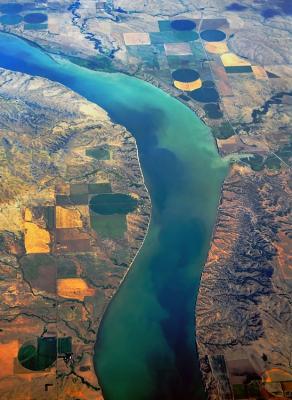I went and saw a screening of King Corn this weekend. It was amazingly good, and I have to admit made me a little home sick (Oh flat Ohio, oh barren wastelands, how I miss thee). Ian Cheny one of the creators was there, and answered questions after. He was really funny and also very informative. The story revolves around these two “city boys” who move out to the mid-west and grow an acre of corn. They then follow that corn through its life to see what is becomes, where it goes, and how it effects everyone in the supply chain. The movie is fantastic and I highly recommend you see it, also check out their blog for more videos.
Here is a taste.
One of the things Ian talked about that was not in the movie was how all the fertilizer that they used on their acre and how it effected the people down river in the Gulf of Mexico. They were forced to take that part of the movie out due to budget issues.
Midwestern farming, and increased water flowing into the Mississippi River as a result, have injected the equivalent of five Connecticut Rivers’ worth of carbon dioxide into the Mississippi each year over the last 50 years, according to a study published this week in the journal Nature.
“It’s like the discovery of a new large river being piped out of the corn belt,” said Peter Raymond, lead author of the study and an ecologist at Yale University. “Agricultural practices have significantly changed the hydrology and chemistry of the Mississippi.”
The research team analyzed Mississippi River data as much as 100 years old. The data had been warehoused at two New Orleans water treatment plants.
“This impressive effort has led to important conclusions about the influence of land-use practices on carbon dioxide in the environment,” said Martyn Caldwell, program director in NSF’s division of environmental biology. “The implications for other materials being transported into river systems are significant.”
The researchers tracked changes in the levels of water and bicarbonate, which forms when carbon dioxide in ground water dissolves minerals. Bicarbonate plays an important, long-term role in absorbing atmospheric carbon dioxide, a greenhouse gas. Oceans then absorb carbon dioxide but become more acidic in the process.
“Ocean acidification makes it difficult, for example, for certain organisms to form hard shells,” said Eugene Turner, a co-author of the paper and a marine ecologist at Louisiana State University.
The researchers concluded that liming and farming practices, such as changes in drainage and crop type and rotation, are likely responsible for the majority of the increase in water and carbon in the Mississippi.
The researchers believe that increased nutrients in the Mississippi also are altering the chemistry of the Gulf of Mexico, into which the Mississippi flows.
Ian mentioned that shrimp farmers were yelling at him because of what he was doing thousands of miles away. I highly recommend everyone go see this movie, you will not think about food and the American food system the same way ever again.
